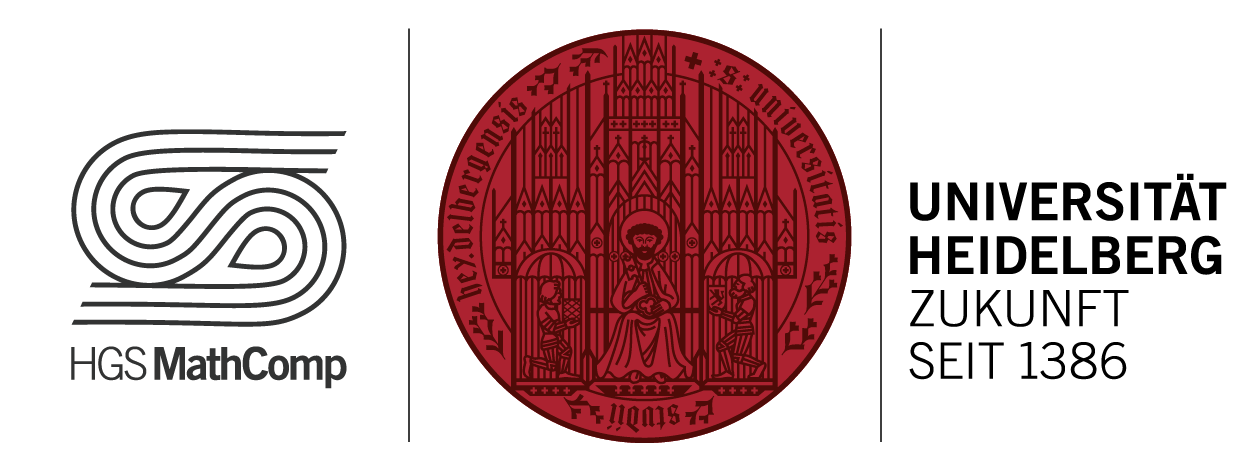Our Members
Most HGS MathComp members are PhD students, called ‘fellows’, but principal investigators (PIs), associate investigators, institutional partners, and our administrative staff are also members of the graduate school.
We welcome PhD students from all faculties of Heidelberg University who use mathematical and/or computational methods in their research. Typically, our members work in mathematics and computer science, natural sciences such as biology, physics, and chemistry, and the humanities, for instance in archaeology, art history, or linguistics.
Principal Investigators - professors and junior group leaders - join based on their thematic relation to the core areas of HGS MathComp. They provide training opportunities and support our PhD students. Currently, more than 50 PIs are full members. Other researchers at Heidelberg University and at partner institutions can join the graduate school temporarily as associated investigators. While they do not vote in our governing bodies, they are otherwise fully integrated and encouraged to participate in our training program and events.
HGS MathComp’s institutional partners include international partner universities, research institutes, and companies. We are constantly expanding our network and invite all institutions interested to contact us. Our administrative staff in the central office support our researchers and coordinate the training program and other activities, such as the Upstream Program and the Romberg Program.
Become a Member
Master graduates of all disciplines are welcome, provided that their PhD project has a mathematical and/or computational focus. Graduates of the IWR Master's program in Scientific Computing have the most direct entry and the best thematic fit. Bachelor graduates are encouraged to consider this program.
As an HGS MathComp fellow, you have free access to our training program and to the various types of financial support we offer, as outlined in the section on benefits below.
To become a fellow, please send the following information via email.
- Short CV
- Title and abstract (max. 20 lines) of your PhD research topic
- Name and department or institute of your first supervisor
At the same time, you should register with your faculty and start putting together your Thesis Advisory Committee (TAC).
Contact us and make an appointment if you would like to discuss the procedure in person.
Are you a Principal Investigator interested in joining? Contact us via email.
Your Benefits as an HGS MathComp Fellow
We strongly believe that providing a dedicated environment for our fellows to carry out their PhD projects will help to raise the quality of PhD research and allow PhD students to concentrate fully on their projects. You can access our support measures at any time during your PhD phase.
Your benefits include:
- Support from the Thesis Advisory Committee (TAC), which will help you plan the next steps in your research project and advise you on operative issues.
- Free participation in our training program covering theory & methods, key competences, and practicals & schools, plus reimbursement for courses taken outside HGS MathComp.
- A final certificate of your extra qualifications.
- Financial support of up to € 1,000 to attend a conference, workshop, or summer school during your PhD phase. Use this for a networking conference in your first year to learn more about your field, or later with a contribution of your own research.
- Funding to employ a research assistant (Hiwi) for up to six months to support you in your research.
- Funding to invite guest fellows and researchers.
- Reimbursement for courses and certificates outside HGS MathComp.
- Parent support for PhD students who become parents during their research project: Extension of funding of their position for 12 months; stipend or 50% position TVL-E13; fully funded by HGS MathComp.
- Women in science networking through the Upstream Program.
Your Duties as an HGS MathComp Fellow
HGS MathComp is like a support club for all its members. Besides the various support measures, there are also some duties. Compared to the benefits, these are few:
- Give a total of two presentations (Annual TAC Meeting) on the status of your PhD project to your Thesis Advisory Committee.
- For your final certificate, keep a record (Blue Sheet) of the courses, schools, and conferences attended, membership in scientific groups, leadership roles in student societies, and research visits.
- Attend the Annual Retreat, a two- or three-day scientific workshop organized by the fellows for the fellows.
- Attend the annual Fellows’ Assembly during which you elect the Fellow Speakers.


